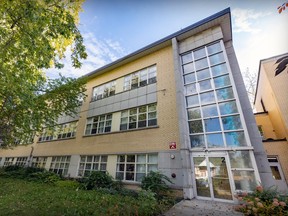Five to 10 people per day are being turned away because Jardins Gordon has been at capacity since it opened on Dec. 1.

A former seniors’ residence, the Jardins Gordon in Verdun was hurriedly transformed into a shelter for the unhoused and was opened on Dec. 1 with a capacity of 50 beds.
“We’re always at 50 people, and we even took 51 on one night because we didn’t want to turn people away,” said Martin Raymond, director general of the Société de Développement Social, which runs the shelter. “We’re refusing five to 10 people per day.”
Raymond said relations with neighbours appear to be going well, and he has not received any complaints.
Among the neighbours approached by The Gazette, most said they didn’t experience any issues living next to the shelter.
“I haven’t noticed anything at all, and I’m really happy that they’re using the building for people in need,” said Jessica Nicksy, who lives on Gordon St., and was walking by the building with her husky-boxer mix, Zucchini. “I’m very glad they have somewhere to go. If people are upset that homeless people exist, they should go to their elected representatives and tell them to make the solutions better.”
However, there are some problems with the shelter itself, said Vanessa Maddix, who spent a night there last week.
“There is no hot food. They just give sandwiches, and (women have to) share a room, and some people really smell badly,” said Maddix, who was brought to the shelter by taxi after she was found sleeping in a métro station on a cold night.
Maddix is on two separate lists for permanent housing. She has been living on the street since last summer, after being evicted because she couldn’t afford her rent. She was happy to find a warm spot because many shelters have turned her away.
“A lot of places tell me they’re full, so it’s difficult,” Maddix said.
Raymond said the low quality of the food is a problem, but his shelter doesn’t have a working kitchen, so the solutions aren’t obvious.
“But it’s something we will improve on in the coming months,” he said.
He’s also concerned about the general lack of space for all unhoused people in the area.
“The really frigid temperatures haven’t started yet,” Raymond said. “This will be a challenge in the next few days or weeks. Right now, there are about 600 spaces missing on the whole island of Montreal. That’s not nothing. Everyone is over capacity.”
Speaking for the CIUSSS du Centre-Sud-de-l’Île-de-Montréal, Marianne Paquette said there are currently 5,500 spaces in shelters in Montreal, and another 220 will be added in the coming weeks. The 220 additional spaces are being created in response to the latest figures on homelessness that showed an increase of 44 per cent province-wide.
The province has dedicated an additional $9 million for the Montreal area to respond to the crisis. Despite that additional funding, organizations are struggling to meet the needs of those who can’t afford to eat.
The situation is similar at Welcome Hall Mission, where the 9,000 regular users of its food bank represent an increase of 3,400 from a year before, while operating costs have increased.
Although Welcome Hall Mission provides overnight shelters, its CEO, Sam Watts, said the response to the crisis shouldn’t be creating more emergency shelters, it should be creating more permanent housing for those in need, better support networks, and more financial assistance.
“This focus on shelter space is shining the light in the wrong area, because what people need is that the shelter should be a pit stop on the way back to something better,” Watts said. “With this diverse and increasingly complex population, we have to design spaces that meet the needs of those people, and the good news is that it’s possible to do. We have been doing it. All we need is the help of the government, so we can scale up.”
Watts said his organization has been putting people back into housing at a rate of one person per day.
“I think the challenge, going into 2024, is that we need our government partners to coordinate their efforts, because we all need to be on the same page, and it’s obvious when we’re not because the people who need to be served don’t get served properly.”